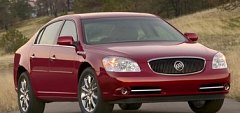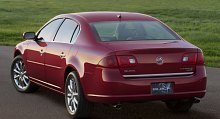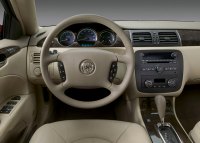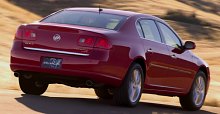|
 Everything
seems new at Buick. Recently, the long serving nameplate Century and
Regal have been replaced with LaCrosse. Now LaSabre and Park Avenue are
being replaced with Lucerne. Reduce nameplates, reduce product
overlapping and reduce internal competition are the new strategy of GM.
To restore competitiveness against the Japanese, rationalization is the
only way. Everything
seems new at Buick. Recently, the long serving nameplate Century and
Regal have been replaced with LaCrosse. Now LaSabre and Park Avenue are
being replaced with Lucerne. Reduce nameplates, reduce product
overlapping and reduce internal competition are the new strategy of GM.
To restore competitiveness against the Japanese, rationalization is the
only way.
Buick used to be troubled by one problem - its customers are 60 years
old in average. If the trend continue, in 10 years time it will lose
all customers and sink like Oldsmobile. To attract younger customers,
Lucerne draws on a sporty design. Its windscreen and rear window are
angled to 60 and 70 degrees respectively, in addition to very long
overhangs, delivering a sleek and sporty profile. However, the overall
design is not as striking as the late Oldsmobile Aurora. Besides, its
organic headlamps and grille look rather tasteless.
 The Lucerne is very, very big.
Measuring 5.2 meters long and has a 2934mm wheelbase, it is a modern
dinosaur. Depending on engines and options, the car weighs between 1707
kg and 1820 kg, so it won't please environmentalists. It offers both 5
and 6 seats configuration. Each passenger should enjoy plenty of space,
although the same can be said to Toyota Avalon. GM openly said this
Toyota is the benchmark and the key enemy of Lucerne. Ironically, once
upon a time Avalon was seen as an alternative to the dominating
Buick.... The Lucerne is very, very big.
Measuring 5.2 meters long and has a 2934mm wheelbase, it is a modern
dinosaur. Depending on engines and options, the car weighs between 1707
kg and 1820 kg, so it won't please environmentalists. It offers both 5
and 6 seats configuration. Each passenger should enjoy plenty of space,
although the same can be said to Toyota Avalon. GM openly said this
Toyota is the benchmark and the key enemy of Lucerne. Ironically, once
upon a time Avalon was seen as an alternative to the dominating
Buick....
 Despite of the new look, don't
ever think Lucerne is an all-new car. Because of the lack of fund, GM
could not afford a new front-drive full-size platform. Instead, it
updated the long-serving G-platform which was also the base of the
outgoing Park Avenue and LaSabre. In its hey days, the G-platform
served 6 cars in
total. Today, only Lucerne and Cadillac DTS continue relying on it. The
G-platform employs MacPherson strut and semi-trailing arm suspensions
in an old fashion way. That's not a good starting point to build a
modern car. Despite of the new look, don't
ever think Lucerne is an all-new car. Because of the lack of fund, GM
could not afford a new front-drive full-size platform. Instead, it
updated the long-serving G-platform which was also the base of the
outgoing Park Avenue and LaSabre. In its hey days, the G-platform
served 6 cars in
total. Today, only Lucerne and Cadillac DTS continue relying on it. The
G-platform employs MacPherson strut and semi-trailing arm suspensions
in an old fashion way. That's not a good starting point to build a
modern car.
However, you must admire GM's persistence in old things.
The small-block V8 of Corvette is one example, Lucerne's G-platform is
another. Compare with Avalon, the Lucerne does not feel any inferior.
It rides at least as good, handles a touch better, and noticeably
better if the optional Magnetic Ride Control adaptive suspension is
chosen. Its chassis feels strong and NVH engineering is excellent. The
cabin is admirably quiet, even more so than the Toyota.
 The design of the cabin is rather
dull, but GM is proud with its vastly upgraded materials and build
quality. Unquestionably, it is very good by GM's standard, but also
unquestionably, it is not good enough to compare with the Lexus-like
Avalon. That's why GM complements with generous equipment: 9-speaker
audio, heated/cooled seats, remote engine start, rain sensing wipers
and DVD navigation. But then Toyota is also pretty generous in this
area. The design of the cabin is rather
dull, but GM is proud with its vastly upgraded materials and build
quality. Unquestionably, it is very good by GM's standard, but also
unquestionably, it is not good enough to compare with the Lexus-like
Avalon. That's why GM complements with generous equipment: 9-speaker
audio, heated/cooled seats, remote engine start, rain sensing wipers
and DVD navigation. But then Toyota is also pretty generous in this
area.
Another ancient thing in the Buick is the 197hp 3.8-litre iron-block
push-rod V6. I can't remember how many times I described it in AutoZine
over the years. Frankly speaking, facing more and more new generation
V6s from competitors (now even including Hyundai !), the Series III V6
is no longer competitive. It is reasonably refined, but today
"reasonably" is no longer enough in this class. It is reasonably
torquey, but it produces 83 horsepower less than Avalon ! this make us
wondering why we have to pay the same money as Avalon for a rather slow
performance (0-60 in 9 seconds), higher fuel consumption and less
refinement.
 The engines Lucerne offers are
very polarized. If the push-rod V6 is the South pole, then the North
pole must be the all-alloy 4.6-litre 32-valve Northstar V8, which is shared with
Cadillac DTS. It pumps out 275 horsepower and should take the car from
0 to 60 mph in a more competitive 7.6 seconds. That's still some way
behind Avalon and Hyundai Azera though, blame to the heavy weight and
the use of 4-speed automatic. The engines Lucerne offers are
very polarized. If the push-rod V6 is the South pole, then the North
pole must be the all-alloy 4.6-litre 32-valve Northstar V8, which is shared with
Cadillac DTS. It pumps out 275 horsepower and should take the car from
0 to 60 mph in a more competitive 7.6 seconds. That's still some way
behind Avalon and Hyundai Azera though, blame to the heavy weight and
the use of 4-speed automatic.
Performance-wise, Lucerne cannot keep up with most rivals. Otherwise,
it is still a competitive but unremarkable package. Can it save Buick
from falling? sadly, I don't think so. To lure customers back from the
Japanese (and now Korean as well), Buick needs a really remarkable car.
Unfortunately, both LaCrosse and Lucerne are not such cars.
|